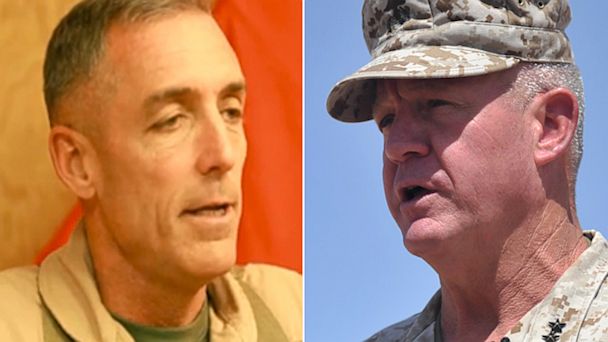Two Marine Generals Asked to Retire for 2012 Attack in Afghanistan

(Credit: DVIDS|Adek Berry/AFP/Getty Images)
WASHINGTON - In a rare move, the Commandant of the Marine Corps has recommended that two senior Marine generals retire because of their failure to adequately protect a large base in southern Afghanistan from a Taliban attack last September in which two Marines were killed and six Marine jets were destroyed.
Eight other Marines and eight British troops were also injured in the attack.
The recommendation from Gen. James Amos that two Marine generals responsible for the base retire in effect means they are being fired.
According to a Marine Corps press release, Amos decided on the course of action after reviewing a four-month investigation conducted by U.S. Central Command into the Sept. 14, 2012 attack.
Under the cover of darkness, 15 Taliban fighters dressed in U.S. Army uniforms cut a hole into the perimeter fence of Camp Bastion, the sprawling joint U.S.-British base located in southern Afghanistan's Helmand Province. The Taliban fighters then snuck onto the base's flight-line, where they began to destroy Marine aircraft housed at the base, eventually destroying six Marine Harrier fighter jets and severely damaging two others. It was the largest loss of U.S. aircraft in the entire war in Afghanistan.
The two officers Amos is holding accountable for the attack are Maj. Gen. Charles M. Gurganus, the top Marine commander in Afghanistan at the time of the attack, and Maj. Gen. Gregg A. Sturdevant, who headed Marine aviation units there.
Amos determined they "did not take adequate force protection measures within the range of responses proportionate to the threat," the Marine statement said.
Amos recommended that Gurganus's nomination for a third star be rescinded, and that Sturdevant receive a Secretary of the Navy Letter of Censure. According to the Marine release, "The Commandant has asked both Generals, in spite of long and distinguished careers, to retire."
As the overall Marine commander in Afghanistan, Gurganus "bore final accountability for the lives and equipment under his command," Amos determined. He cited him for an "error in judgment when conducting his risk assessment of the enemy's capabilities and intentions"
As the aviation commander, Sturdevant "did not adequately assess the force protection situation at Bastion Airfield," Amos said.
Though his Marine forces were based on the British side of the base, "Sturdevant remained responsible for assessing vulnerabilities and mitigating them with his own forces by having a layered, integrated, defense-in-depth," Amos said.
Though Amos praised the two commanders for their leadership of Marine forces, he said that command is a "sacred responsibility" and he felt that in developing the camp's force protection levels they "did not exercise the level of judgment expected of General Officers."
"Marines can never place complete reliance for their own safety in the hands of another force," Amos is quoted as saying in the press release.
The deadly attack also generated headlines because Britain's Prince Harry, was serving as a helicopter pilot at the base at the time of the attack. Officials said at the time that he was not under any threat.